Key takeaways:
- Understanding individual motivations and fostering an inclusive team environment enhances collaboration and morale.
- Effective management requires clear communication, adaptability to team dynamics, and celebrating achievements.
- Key leadership skills include effective communication, empathy, and decisiveness to ensure team alignment and motivation.
- Regular feedback and recognition of small wins significantly improve team dynamics and morale.
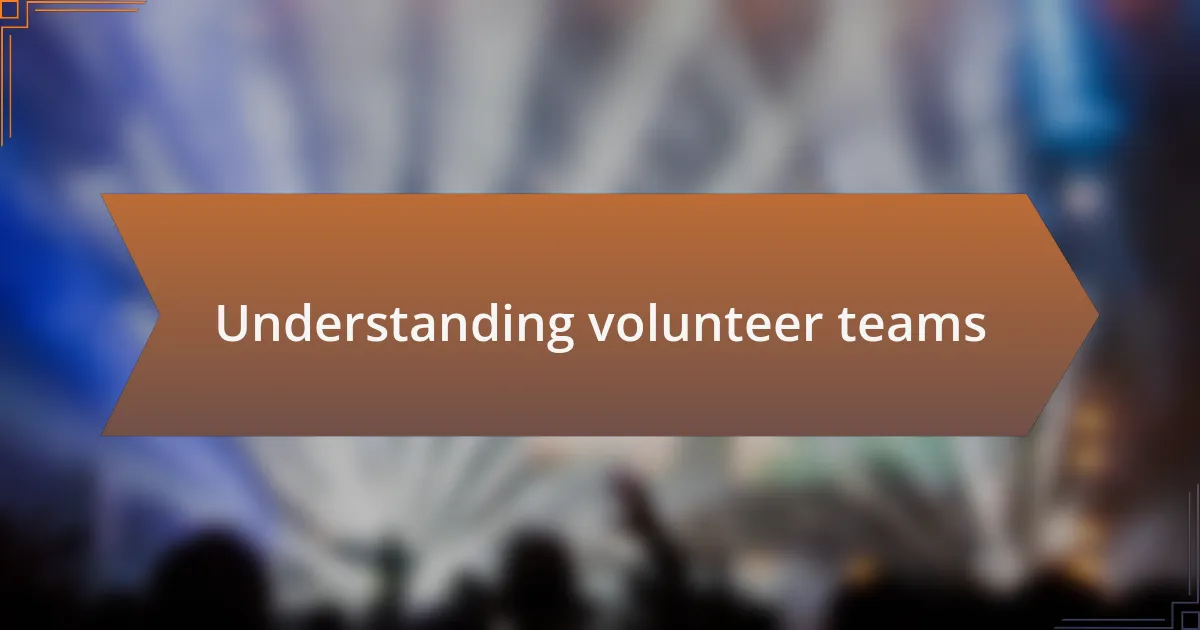
Understanding volunteer teams
Understanding volunteer teams begins with recognizing that every volunteer brings their own unique motivations and skills to the table. I remember my first experience managing a volunteer group; it was fascinating to see how each person had distinct reasons for joining, be it personal growth or a desire to give back. Have you ever wondered what drives someone to dedicate their time just for the sake of helping others?
The dynamics of a volunteer team can significantly influence its effectiveness. From my experience, I’ve noticed that a supportive and inclusive atmosphere fosters collaboration and boosts morale. When I took the time to acknowledge individual contributions, I could feel a positive shift in the team’s energy—everyone felt valued, and it transformed our teamwork into something genuinely special.
Understanding the diverse backgrounds of team members is crucial in creating a harmonious environment. I often reflect on how learning about my volunteers’ stories not only helped me connect with them on a personal level but also enriched the overall experience of our event. Have you considered how powerful it can be to create a culture where everyone feels seen and heard?
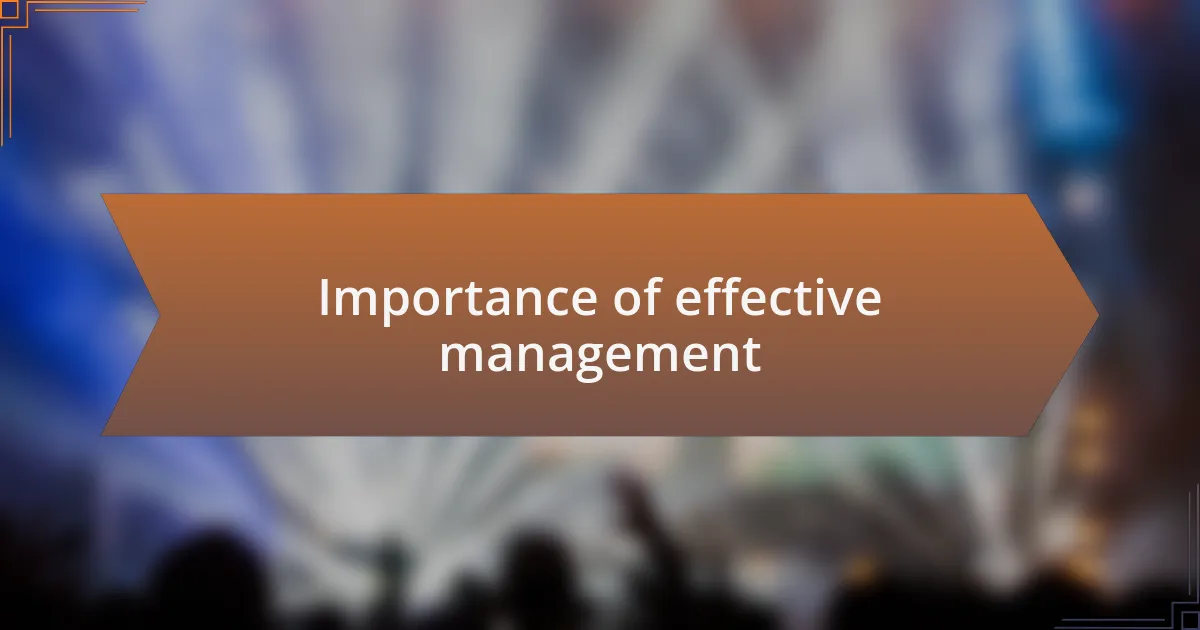
Importance of effective management
Effective management of volunteer teams is paramount, as it directly influences the overall success of any event. I recall a time when I was tasked with organizing a community festival, and without strong leadership, the project quickly began to feel chaotic. I learned that taking the initiative to set clear expectations and communicate openly turned the tides, guiding everyone toward a common goal, which ultimately led to a successful outcome.
Another aspect I have found crucial is the ability to adapt management styles based on the unique makeup of the team. For instance, during one event, I was faced with a mix of highly experienced volunteers and newcomers. By balancing my approach—mentoring the novices while empowering the veterans—I created an environment where everyone could thrive. Have you thought about how tailoring your management strategy to suit your team can lead not just to efficiency, but to a richer experience for everyone involved?
Lastly, recognizing and celebrating achievements, both big and small, can significantly enhance a volunteer team’s motivation. I remember celebrating each milestone during a charity run I organized; whether it was reaching a fundraising goal or simply completing a training session, acknowledging these moments brought the team closer together. It’s amazing how a simple ‘thank you’ can resonate deeply, fostering a sense of unity and shared purpose. How do you ensure that your volunteers feel appreciated in their contributions?
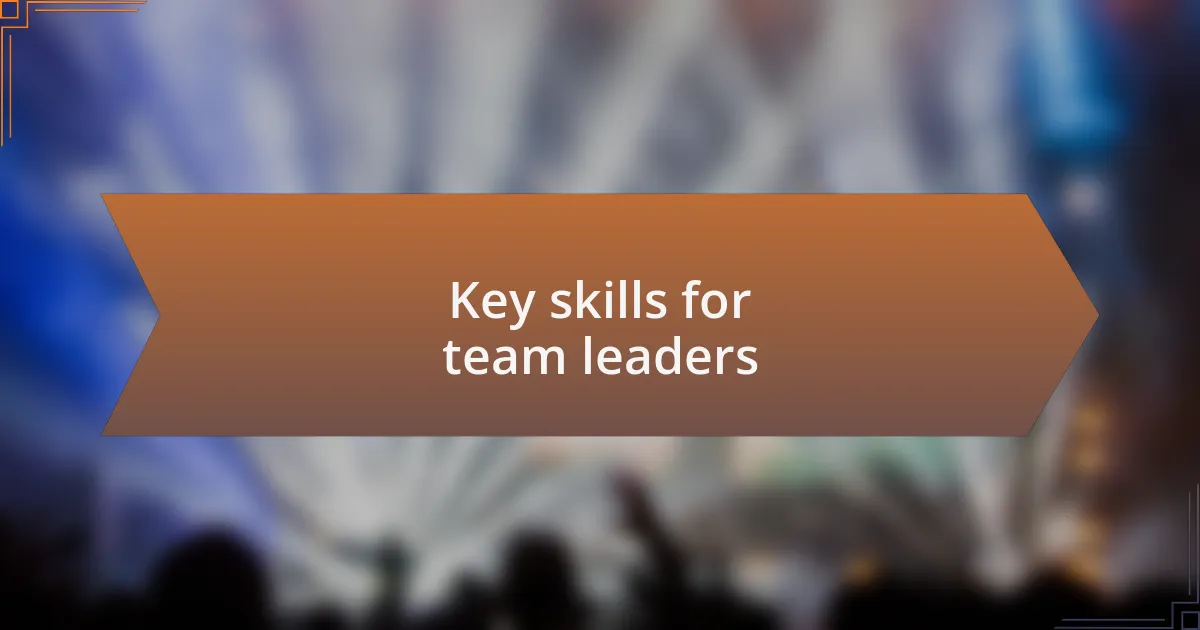
Key skills for team leaders
One of the key skills for team leaders is effective communication. I recall a situation where miscommunication almost derailed our event timeline. By establishing regular check-ins and using clear, concise language in our briefings, the team felt more aligned, and we avoided costly mistakes. Have you ever noticed how just a few well-placed words can clear confusion and boost morale?
Another skill that often goes overlooked is empathy. I remember volunteering alongside a colleague who was struggling with her tasks. Checking in and offering support not only empowered her to overcome her challenges but also fostered a more inclusive atmosphere within the team. When leaders show they care about individual experiences, it can transform the dynamic and inspire greater commitment. Have you thought about how a little empathy can go a long way in facilitating a collaborative spirit?
Lastly, I’ve come to appreciate the value of decisiveness. In the midst of organizing a large-scale fundraising event, there came a moment when we faced conflicting ideas on how to proceed. I had to make a quick decision after gathering input, and that clarity helped the team regain focus. Being decisive doesn’t mean neglecting team input; rather, it balances collaboration with the ability to take charge when necessary. How do you approach decision-making when different perspectives come into play?
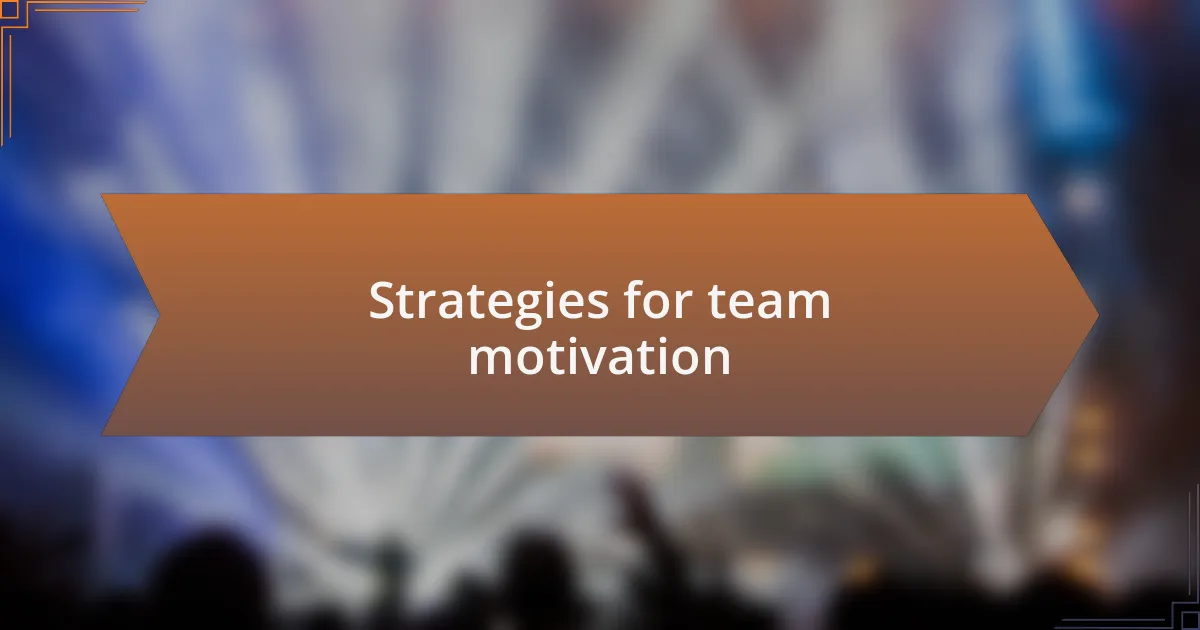
Strategies for team motivation
Creating a motivating environment for volunteer teams is essential for achieving our goals. One strategy I found effective is recognizing individual contributions. During one particular event, I made it a point to spotlight a volunteer’s hard work during team meetings. The smile on their face was priceless, and it inspired others to bring their A-game. Have you noticed how acknowledgment can breed enthusiasm and commitment among team members?
Another approach that really worked for me was setting achievable milestones. I remember working with a team on a community festival where we broke down our goals into smaller tasks. Each time we met one of those milestones, we celebrated together, fostering a sense of accomplishment. This not only kept the energy high but also built a momentum that kept us moving forward. How do you celebrate progress within your teams?
Lastly, I’ve experienced the impact of creating a shared vision. When our team collaborated on a meaningful cause, we all felt more connected and inspired. During a charity event, I encouraged volunteers to share their personal connections to the cause, which sparked a passionate discussion. This shared sense of purpose transformed our teamwork. Have you ever felt that powerful connection when everyone is working toward a common goal?
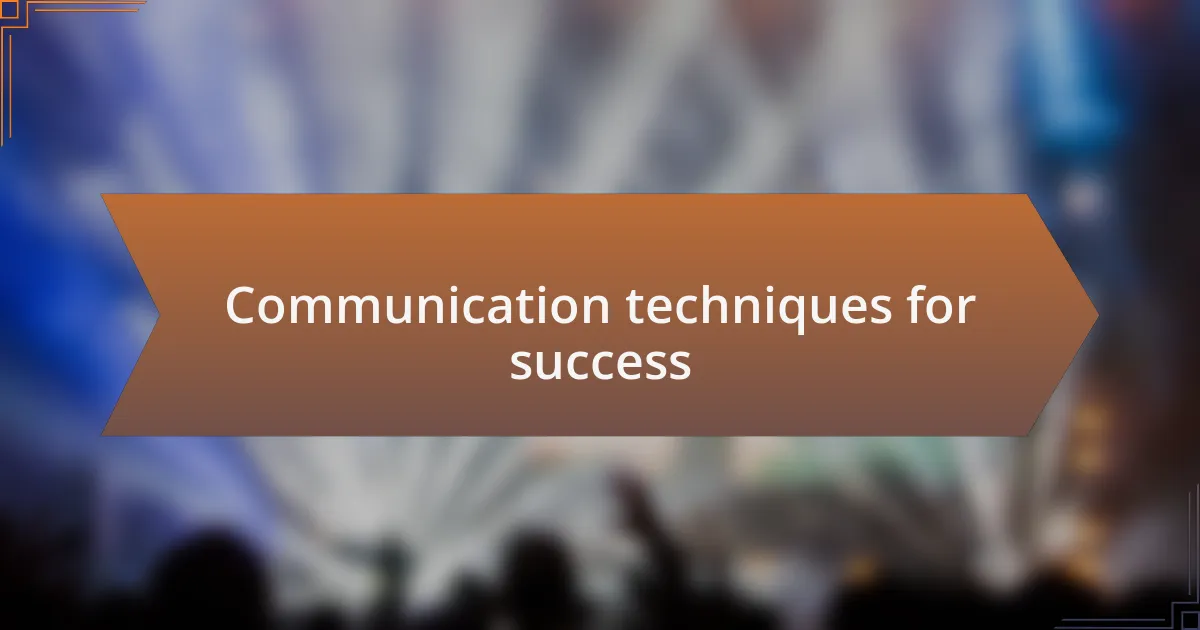
Communication techniques for success
Effective communication is the backbone of a successful volunteer team. I’ve found that utilizing various channels, like group chats and regular check-ins, allows everyone to stay informed and engaged. One time, I implemented a daily morning briefing during a large event preparation, and it worked wonders in aligning our goals and expectations. Have you noticed how clarity in communication can eliminate confusion and boost team morale?
Active listening is another communication technique that truly makes a difference. I remember a situation where a volunteer shared their concerns about the workflow during an event setup. By taking the time to listen and validate their feelings, I not only solved the issue but also encouraged others to express their thoughts openly. Isn’t it amazing how fostering an environment where everyone feels heard can transform the team dynamic?
Additionally, using positive reinforcement can elevate the communication atmosphere. After one event, I made a habit of sending personalized thank-you notes to each volunteer, mentioning specific contributions they made. This small gesture demonstrated my appreciation and strengthened our rapport. Have you ever considered how those little tokens of gratitude can pave the way for ongoing commitment and connection?

My personal management experiences
Managing volunteer teams has taught me invaluable lesson about adaptability. I remember during one particular event, we faced an unexpected shortage of volunteers on the day of the setup. Rather than panicking, I quickly reorganized tasks and enlisted team members to take on multiple roles. This flexibility not only kept the event running smoothly but also built a sense of camaraderie that made everyone feel invested. Have you ever found that a challenge can sometimes bring your team closer together?
One significant experience that stands out involved a conflict between two volunteers with differing opinions on how to approach a task. Instead of picking sides, I facilitated a discussion where both could express their viewpoints. It turned into a productive debate that led to a creative solution neither had considered initially. I learned that addressing conflicts head-on can enhance collaboration, but it requires patience and a willingness to understand varying perspectives. Isn’t it fascinating how a little mediation can unlock such potential within a team?
Moreover, I’ve realized the importance of recognizing individual strengths within the group. During a community outreach event, one volunteer surprised me with their artistic skills. I entrusted them with designing promotional materials, which not only showcased their talent but also boosted their confidence. This personalization makes each team member feel valued and motivates them to contribute even more. Have you witnessed how empowering individuals can foster an environment of enthusiasm and creativity?
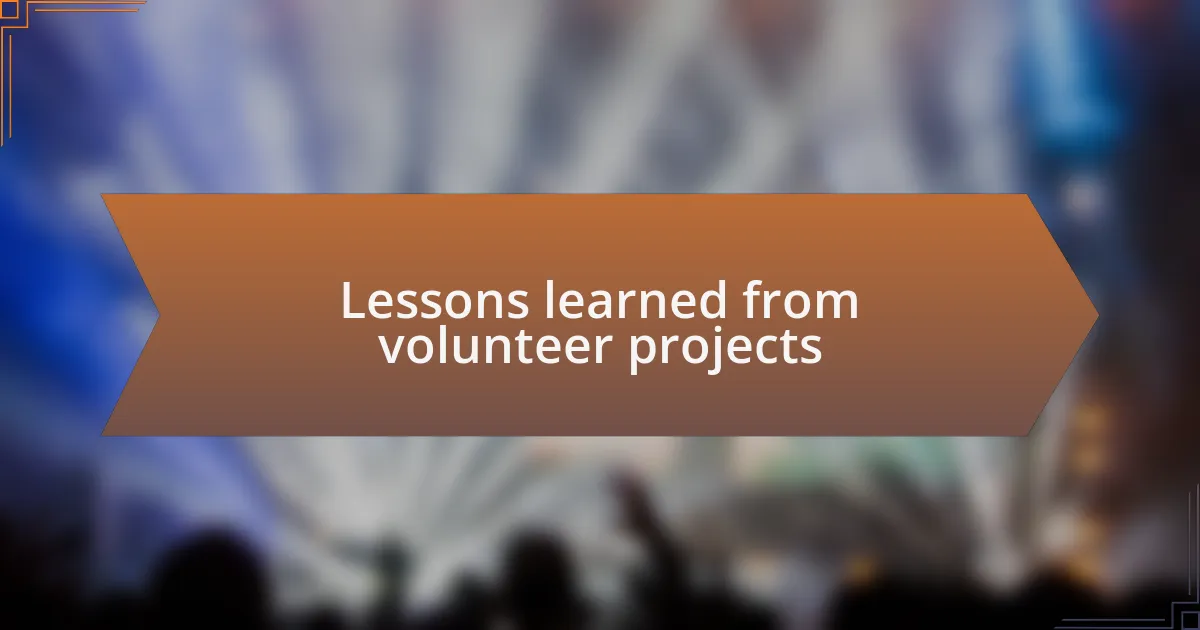
Lessons learned from volunteer projects
One lesson I’ve taken to heart is the vital role of communication in volunteer projects. During a large festival, I learned this the hard way when critical information about changing schedules didn’t reach everyone. It resulted in confusion at the event, with some volunteers unsure of their tasks. This experience taught me that keeping lines of communication open, whether through regular updates or team huddles, is essential for smooth operations. Have you ever found yourself lost due to a lack of information?
Additionally, I’ve come to appreciate the power of feedback. After each event, I implemented a debriefing session where volunteers could share their thoughts. One time, a quieter member opened up about feeling overwhelmed during the event but also provided great suggestions on how to streamline our processes. That honest exchange not only improved my management style but also made everyone feel their input was important. Isn’t it amazing how a simple feedback mechanism can transform a team’s dynamics?
Lastly, I found that celebrating small wins can significantly enhance team morale. During one of our community service projects, we took a moment to acknowledge the efforts of individual volunteers after completing each phase. I watched as their faces lit up with pride and accomplishment. It reminded me that recognition, no matter how small, fuels motivation and fosters a culture of appreciation. How often do you pause to celebrate the little victories in your team?